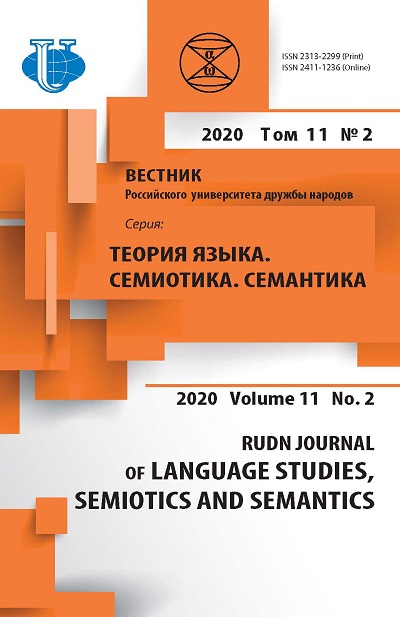Transformations of the Language of Diplomatic Correspondence between the Entente Countries and Germany before The First World War
- Authors: Medvedev Y.Y.1, Ntsiwou Batiako L.D.2
-
Affiliations:
- International Information Technology University
- Peoples’ Friendship University of Russia (RUDN University)
- Issue: Vol 11, No 2 (2020): Semantics of Universal and Specific in the Language and a Text
- Pages: 384-397
- Section: SEMIOTICS OF TEXT AND DISCOURSE
- URL: https://journals.rudn.ru/semiotics-semantics/article/view/23589
- DOI: https://doi.org/10.22363/2313-2299-2020-11-2-384-397
- ID: 23589
Cite item
Full Text
Abstract
The spheres of official communication, which include public administration, legal proceedings, legislation, etc., are regulated, in contrast to everyday communication. Activities in each of these spheres are subject to precisely defined, strictly established rules that regulate and legitimize it. The diplomatic language is characterized by a special degree of regulation. “The weight of a word” in international politics is extremely heavy, since the fate of entire states and peoples may depend on successful or unsuccessful communication between diplomats. The strict standardization of the diplomatic language should serve as a kind of deterrent against the growth of tension in international relations. The goal of this study is to identify the degree of susceptibility of the diplomatic correspondence language to transformations in the political crisis context (during wartime). The research material is based on the texts from the Orange book, a collection of diplomatic correspondence between warring countries before the outbreak of the First World War. The application of the contextual analysis method made it possible to determine the vector of changes in the diplomatic correspondence language caused by the political crisis: from restraint, emotionlessness, tact and politeness accepted in the diplomatic sphere to ultimatumness, categoricalness, manifestation of emotions and deviation from the principle of objective reflection of events.
About the authors
Yevgeniy Yu. Medvedev
International Information Technology University
Author for correspondence.
Email: eugene_medvedev@mail.ru
Ph.D., Assistant Professor at the Languages Department
34/1, Manasa street, Almaty, 050000, KazakhstanLauzin Duborgel Ntsiwou Batiako
Peoples’ Friendship University of Russia (RUDN University)
Email: ntsiwou@yandex.ru
Ph.D. student of the Department of General and Russian Linguistics
6, Miklukho-Maklaya street, Moscow, 117198, Russian FederationReferences
- Zherebilo, T.V. (2011). Terms and concepts of linguistics: General linguistics. Sociolinguistics: Dictionary. Nazran: Pilgrim LLC. (In Russ.).
- Andreeva, A.N. (2004). Stylistics: Textbook. Novosibirsk. (In Russ.).
- Sheigal, E.I. (2000). The Semiotics of Political Discourse: Monograph. Volgograd: Change publ. (In Russ.).
- Dictionary of sociolinguistic terms (2006). V.Yu. Mikhalchenko (Ed.). Moscow: Russian Academy of Sciences. Institute of Linguistics. Russian Academy of Linguistic Sciences. (In Russ.).
- Encyclopedia of Law. URL: https://encyclopediya_prava.academic.ru/1680/ (accessed: 28.12.2019). (In Russ.)
- Law Dictionary (1953). S.N. Bratus (Ed.). Moscow: Gosyurizdat. (In Russ.).
- Nicolson, H. (2006). Diplomatic language. Cambon, J. Le Diplomat, Nicolson, H. Diplomacy. Moscow: Nauchnaya Kniga publ. (In Russ.).
- Legal Encyclopedia. URL: https://yuridicheskaya_encyclopediya.academic.ru/2703/ (accessed: 25.12.2019). (In Russ.).
- Volosov, M.E. Diplomatic correspondence In Law Encyclopedia. URL: https://dic.academic.ru/ dic.nsf/enc_law/579/ (accessed: 25.12.2019). (In Russ.).
- The Orange Book (before the war), a collection of diplomatic documents (1914). Negotiations from July 10 to July 24, 1914. The highest manifestos of war. The historical significance of the State Duma on July 26, 1914. St. Petersburg. (In Russ.).
- Valentinova, O.I. (2015). Justification of causal typology of texts. Statement of the problem and its solutions. RUDN Journal of Language Studies, Semiotics and Semantics, 2, 29—35. (In Russ.).
- Valentinova, O.I. (2016). Archetypal features of the medieval theological text and their transformation. Russian Journal of Cognitive linguistics, 3, 109—118. (In Russ.).
- Valentinova, O.I., Denisenko, V.N., Preobrezhansky, S.Yu. & Rybakov, M.A. (2016). System view as the basis of philological thought. Moscow: Izdatelsky dom YaSK. (In Russ.).
- Soloviev, Yu.Ya (1959). Memoirs of a diplomat. Moscow. (In Russ.).
- Aldrovandi Marescotti, L. (1944). The Diplomatic War. Memoirs and excerpts from diaries (1914—1919). Moscow. (In Russ.).
- Hayrapetyan, M.E. & Kabanov, P.F. (1964). The First World Imperialist War of 1914—1918. Moscow. (In Russ.).
- Artemov, V.V. (2012). House of the Romanovs. Moscow: OLMA Media Group publ. (In Russ.).
Supplementary files












